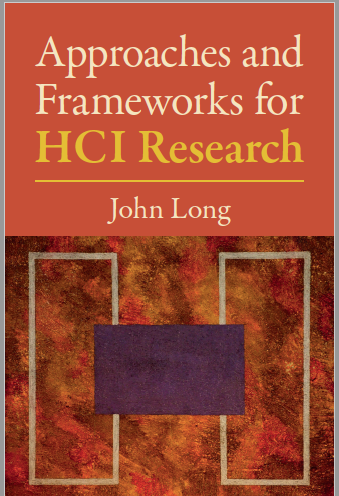
The Blog begins with the original website Blog. The section ends with the publication of the book – ‘Approaches and Frameworks for HCI Research’ in March, 2021 ( www.cambridge.org/9781108719070). Any citations of the earlier Blog section must include the date.
1. 29 February 2016 – User Requirements and Design Problems – Same or Different?
I am often asked ‘What is the difference between ‘user requirements’ and ‘design problems’? I need to pay my dues on this one. The Craft design research exemplar, presented here, includes only user requirements. The Engineering exemplar includes both. No-where is the difference explained.
User Requirements and Design problems – Same or Different?
2. 4 March 2016 – HCI Design Research and HCI Design Practice – What are Their Relations?
I have always argued for the strongest possible relations between HCI research and HCI practice. Here are some suggestions about their possible relations.
HCI Design Research and HCI Design Practice – What are Their Relations?
3. 7 March 2016 – Old Papers Never Die, They Only Fade Away……?
I often wonder, like many other researchers, if papers, published much earlier in time, have anything to say to present researchers, given the radical changes in information technology, which have occurred in the meantime.
Old papers Never Die, They Only fade Away……
4. 12 March 2016 – HCI as Art?
HCI as Art has the problem of conceptualising the work of art itself (the application) and the experience of the person, engaging with the work of art (the user). There is no general consensus about how to conceptualise either. However, I was lucky enough to come across an interesting example of the latter.
5. 3 April 2016 – From MSc Student to UCLIC Director – Some Reflections by Yvonne Rogers
Yvonne Rogers was a member of the MSc class of 1982/83. She was appointed Director of UCLIC in 2011. Her MSc Reflections, then, take on a more general significance. The reflections are prompted by a set of standard headings.
6. 1 May 2016 – Why It is Important to Distinguish ‘Hard’ from ‘Soft’ Design Problems.
‘Hard’ and ‘soft’ are often used with respect to problems in general. The terms have also been used in HCI research to describe design problems.
7. 25 May 2016 – Can HCI Design Frameworks also be Used to Support HCI Design Practice?
Peter Timmer Suggests How an HCI Engineering framework can integrate HCI design practice with business services.
A Sketch of the ‘Conversion Funnel’ Can HCI Engineering Assist in Its Design?
8. 10 June 2016 – Smell-Enhanced Human-Computer Interaction ?
Surely not! Marianna Obrist, however, does not agree.
Smell-Enhanced Human-Computer Interaction?
9. 18 October 2016 – MSc Reflections and More…..
All student MSc Reflections (see elsewhere on this site) include reference to the course, their fellow students and UCL, as an educational institution. Courtney Grant’s Reflections, however, go further as they also reflect aspects of his time and life beyond the MSc. These aspects offer insights to anyone interested in HCI student education.
Courtney Grant – MSc Reflections
10. 24 October 2016 – What Are the Main Types of Knowledge Acquired by HCI Research?
Two of the main types of knowledge, acquired by HCI research, are declarative and proceedural. Declarative knowledge encapsulates the ‘what’, for example models. Proceedural knowedge encapsulates the ‘how’, for example methods. Both are required for the conduct of HCI research. Both are illustrated here in a paper by Hill (2010), concerning the domain of emergency management response to disasters. Comments are for clarification purposes.
Diagnosing Co-ordination Problems in the Emergency Management Response to Disasters
11. 26 October 2016 – Building on Eachother’s Design methods
The extension of MUSE (Method for Usability Engineering) to MUSE(SE) (Method for Usability Engineering for Software Engineers) is an example of researchers building on eachother’s work. MUSE(SE) extends the target user group from human factors engineers to software engineers. The extension involves considerable additional content for MUSE both at medium and low levels of detail. The elements, which MUSE extensions share, constitute a de facto framework (Method for Usability Engineering) and so the basis for building on eachother’s research.
MUSE for Software Engineers – Midlemass J.
The next section of the Blog follows the publication of the book ‘Approaches and Frameworks for HCI Research’ in March, 2021 (www.cambridge.org/9781108719070). The Blog addresses any issues, which relate to the different ways of doing or researching HCI. It will promote the ideas of the book and seek to relate them to the state and developments of on-going HCI research. It will also be used to introduce feedback relevant to the ideas of the book, as may be received by the website. Any citations of the Blog must include the date.
12. 19 February, 2021
First, particular ideas will still be developed; but only with a view to a possible second and subsequent editions of the book.
Second, the publication of original sources will be retained to allow researchers to assess the ideas put forward by the book.
Third, the initiation of dialogue and interview-based exchanges will be used to clarify and expand on the ideas, expressed in the book.
Fourth, the expansion of concepts and themes of the book will pave the way for others to continue their development.
Fifth, ‘right-of-reply’ contributions by authors, whose work is cited in the book, will help to widen the view of the associated ideas.
Sixth, reviews of the book, to be subsequently published in HCI research journals and other publications, will serve to test the strength of the book’s argumentation, associated with the book’s ideas.
Last, blog reflections on the developments in the field of HCI and HCI research by the author will offer an on-going assessment of their relation to the books ideas and the relevance of the latter to the former.
John Long
Blog Categories